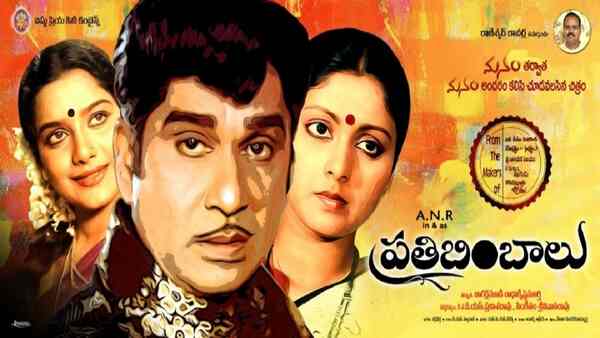Prathibimbalu review: Another reminder of why ANR will always remain the king of tragedies
Written and directed by Singeetham Srinivas Rao, the film, which took over four decades to see the light of day, also stars Jayasudha and Tulasi

Last Updated: 03.33 PM, Nov 09, 2022
Story:
Amidst a verbal banter, a college-student Sudha is challenged by her friends to transform a flower-seller into a sophisticated young man. While she responds to the challenge well and educates him, Sudha finally realises that the man, Dr Ravi, was indeed a medico by profession who was merely pranking her. Sudha falls in love with Ravi but ends up marrying a match suggested by her parents. What prompts her to take that decision and what are its repercussions?
Review:
Prathibimbaalu isn’t yet another movie that’s hitting theatres on a Friday. Much like Kamal Haasan’s Uttama Villain, the film showcases the significance of cinema as a medium that gifts immortality to its actors. Despite featuring heavyweights like ANR, Jayasudha, Tulasi in a film helmed by Singeetham Srinivas Rao, Prathibimbaalu took four decades to see the light of day.
The film’s release offers us an opportunity to celebrate Akkineni Nageswara Rao on the big screen even (8 years) after his death and serves as a testimony to the unpredictability of showbiz. Purely going by its story, Prathibimbaalu is tailormade for ANR to the T. The film is a mishmash of many popular hits of the star - Prem Nagar, Premabhishekam (and partly Mohan Babu’s Gruhapravesam too) and is essentially a tragedy about two men dealing with heartbreak and moving on.
The double role for ANR provides an intriguing spin to the usual tale and offers good scope for drama. Singeetham gives everything that movie buffs expect out of a trademark ANR starrer and still leaves behind his imprint. He comes up with an engaging screenplay with ideal bursts of humour, good music, a few good dramatic twists and solid performances. ANR enjoys going over the top in a familiar space though he is at his best when the film demands him to be understated.
As you’d expect in a double role of any star vehicle - one of them is an idealist and the other has shades of grey. They aren’t brothers but just look-alikes and this aspect furthers the conflict in the film. Like most 80s mainstream films, the existence of female leads is solely dependent on their partners. Sudha transforms an alcoholic husband into a responsible man and proves she’s an ideal wife. Another character Roopa almost dies because she isn’t able to marry the man of her dreams.
Despite the heavy drama on offer, there’s an enjoyable lightness to the film’s treatment, more so in the first hour. Singeetham’s screenplay shows you needn’t try too hard to reinvent the wheel. ANR and Jayasudha bring dignity to their parts whenever they’re around and the story keeps ticking along smoothly. Given the umpteen number of delays the film faced during its making, there are a few continuity issues and the cracks show up in the final hour. The hurried ending too is thrust upon the viewer.
The film would’ve been more respectable if the makers did away with the comedy track featuring Suttivelu and Jaya Malini. The double entendre hasn’t particularly aged well over the years and dilutes the effectiveness of the other segments. The late composer Chakravarthy isn’t given any novel song situations though it’s not a bad album at all - tracks like Vandanamu Radha, Manishikoka Rupam and Priya Swagatham linger in your mind long after the film’s done.
ANR and Jayasudha are the lifelines of Prathibimbaalu while the likes of Gummadi, Annapurnamma, (then child actor) Harish and Kantha Rao do justice to their supporting roles. The pairing of ANR and Tulasi is odd at best and the latter’s hysterical reactions in dramatic situations don’t help. The idea of ‘staple diet’ changes in mainstream cinema frequently and this film provides a window into the pitch and the familiar tropes of a regular 80s fare.
Verdict:
Prathibimbaalu isn’t the ‘golden standard’ among ANR’s films though it remains extremely watchable due to the treatment and the performances. It’s a film that’ll be in the history books not for its quality but for the fact that someone had the conviction to release it in theatres 40 years after it was made.

 Premium
Premium